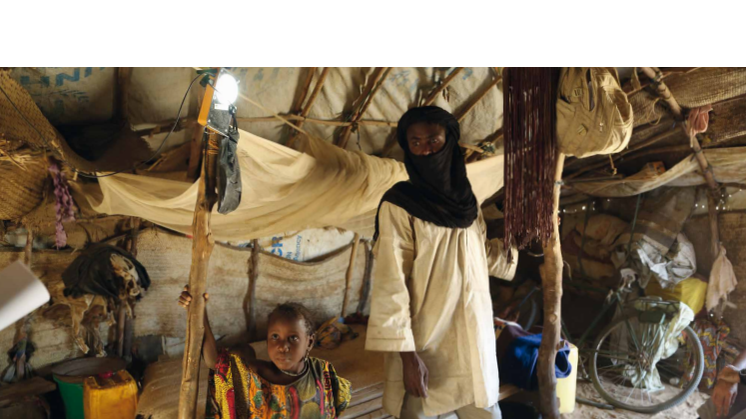News -
Displaced families say ‘We’ll pay for power’
Thousands of refugee families want to pay for better energy supplies so they can take control of their lives, according to a new report.
Researchers from the Moving Energy Initiative found that there is huge demand in camps around the world for modern renewable electrical supplies and cleaner cooking solutions.
They also highlighted a fragmented, and inefficient response to energy provision for displaced people amongst humanitarian organisations.
The authors found that better, and more co-ordinated access to renewable energy could save thousands of families thousands of pounds a year, kickstarting economic activity and transforming camp culture away from one of dependency on handouts.
One of the report authors, Mattia Vianello from Practical Action, said: “There is clear dissatisfaction on the part of refugees, camp administrators and humanitarian workers with the current level of energy provision in the camps, and a corresponding demand for change.
“As the number of displaced people in the world increases and as aid budgets come under further pressure, the imperative to identify cost-effective and sustainable solutions for delivering energy to refugees is more pressing than ever.”
The report, “Price, Products, Priorities: Meeting Refugee Energy Needs in Burkina Faso and Kenya” studied the issues of energy and displacement in detail. Drawing on insights from refugees in Goudoubo camp in Burkina Faso and the Kakuma camp in Kenya, it seeks to promote a better understanding of their energy needs, priorities and preferences, and explores how increased access to energy might help to achieve lasting impactand at what cost. The analysis and conclusions are valid in the wider context of camps for forcibly displaced people and are based on a methodology specially designed for this study.
Key findings include:
- A significant proportion of refugees would pay for cleaner and more efficient energy technologies, but many lack the financial resources required, and the development of markets for such products lacks financial support.
- In Kakuma I, the study showed more than one-third expressed a willingness to pay for high quality renewables - a potential customer base of 5,000 families, with a market worth some $300,000 per year.
- In Goudoubo, two-thirds of residents surveyed expressed a willingness to pay for healthier cooking options - a potential customer base of 2,000 families, with a market worth up to $270,000 per year.
- Centralized electricity supply solutions – mini-grids or grid connections – are more economic than the current use of multiple standalone diesel generators. This piecemeal approach, with each facility managing its own power supply, is wasteful. Greater coordination among humanitarian operations is required so that centralized solutions can be assessed, designed, financed and implemented.
Other findings include:
- Trying to meet basic cooking, lighting and phone-charging needs is costly for refugees, consuming a significant share of stretched monthly budgets.
- Three out of five families in Kakuma I report health problems due to smoke from cookstoves.
- Street lighting is a high priority for residents, due to concerns about security and safety in camps - in Goudoubo, 86 per cent of survey respondents said that more household members would go out after dark if there were better public lighting.
- A variety of energy options giving varying levels and qualities of service is required; current ‘one size fits all’ approaches are inappropriate.
- By working with the private sector and developing markets, cost-effective solutions for refugees can be found which also benefit host communities.
Categories
- energy
- climate change
- practical action
- refugees
- enterprise
- technology
- environment

